The perilous journey of a migrant boat that made it
- Published
A BBC team has been on the trawler and found appalling conditions
This is the story of one of the many migrant boats drifting at sea. Packed with desperate migrants from Myanmar, this boat made it to a village in Indonesia days after a BBC team made fleeting contact with it near Thailand.
Reports came in of a boat carrying 350 migrants, mostly Rohingya Muslims, and stranded at sea, on 13 May. They were left without food or water after their crew abandoned them.
The next day, the BBC found the vessel in waters off southern Thailand, near the Malaysian island of Langkawi, after local fishermen spotted the boat.
The BBC's Jonathan Head found the boat off Thailand (Thursday 14 May): "This is just the most extraordinary scene"
Migrants onboard told the BBC's Jonathan Head that they had been stranded for a week, and that 10 people had already died. Some of them looked as if they were in need of medical attention. They were crying out for assistance.
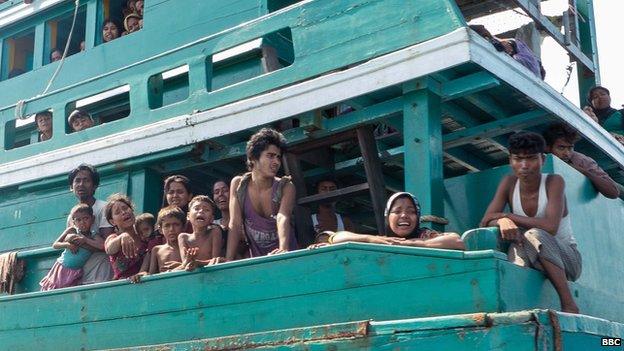
The passengers were abandoned by their crew and their engine had failed
Many pleaded for food and drinking water. A Thai navy helicopter later that evening dropped off food packages.
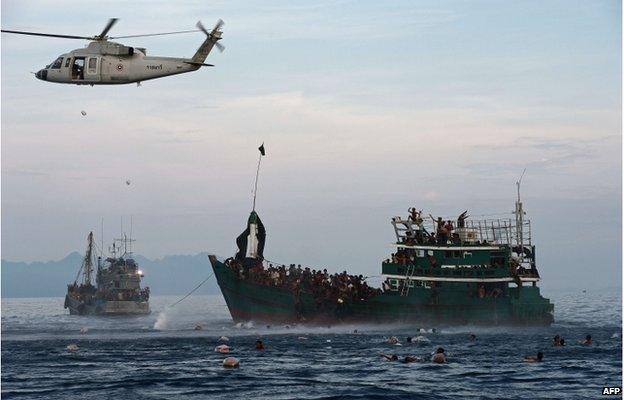
Migrants jumped off their boat and swam to retrieve the packages
Malaysia and Thailand both rejected the boat, taking turns to tow the boat to each other's waters, in what observers condemned as a "ping pong" match.
On Saturday, Thai journalist Taphanee Iestrichai was allowed to observe the military as they boarded the boat, repaired its engine, and taught some onboard how to operate the vessel.
That night, the boat was towed out to international waters, according to several witnesses.
The BBC's Jonathan Head says that the boat of migrants was heading towards Indonesia but they might be sent back to sea again
Thailand insisted that those onboard did not want to stay, and wanted to move on. But Ms Iestrichai told the BBC that said it was clear the migrants needed urgent help and had no idea where to go.
When they were towed out it appeared they were heading not to Malaysia but further on to Indonesia.
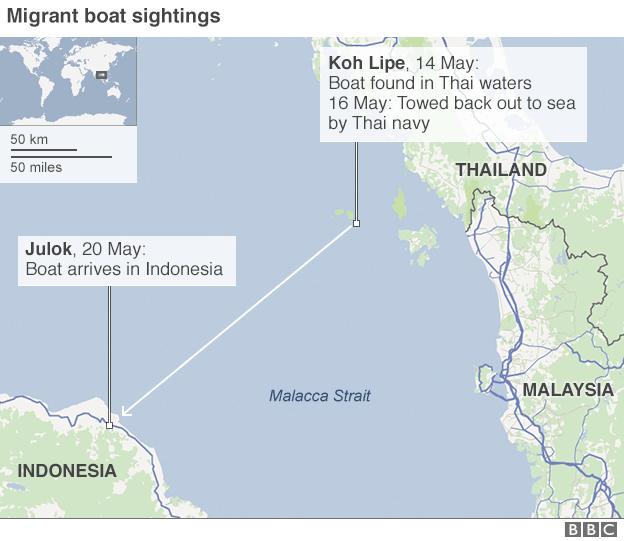
Weather reports on Monday warned of possible rough seas ahead due to the monsoon but efforts by BBC teams in the region to find the boat proved fruitless.
The BBC's Jonathan Head: "It is quite possible we will never hear from it again"
Then, on Wednesday, it was spotted off the coast of East Aceh in Indonesia.
The boat had made it - six days after it was first discovered in Thailand, and 10 weeks since it left Myanmar.
Migrants later told activists that Malaysian authorities took them nearly all the way to Indonesia.
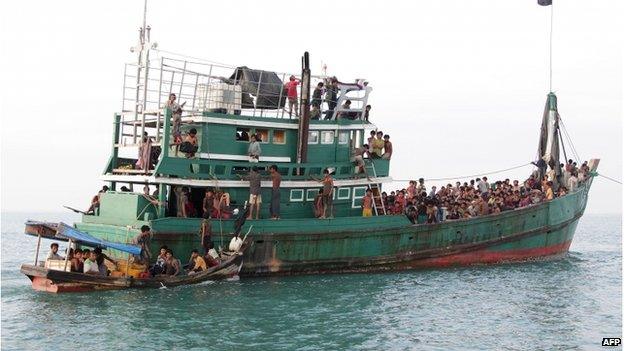
Indonesian fishermen rushed to unload the migrants in smaller boats and brought them ashore
The migrants had been living in appalling conditions for weeks, a BBC team found.
An overwhelming stench permeated the boat; it was strewn with filthy plastic bottles, plates and clothes, said producer Xinyan Yu who boarded the vessel later.
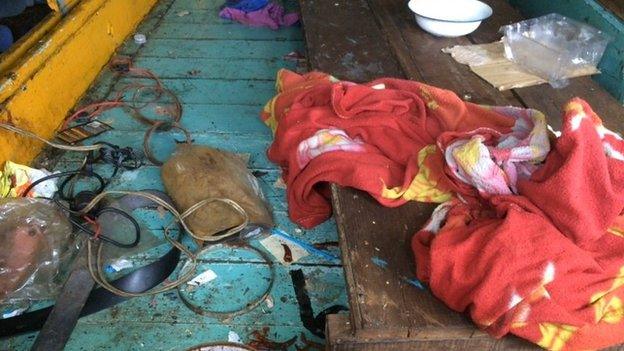
There were insects crawling all over the walls, said our producer
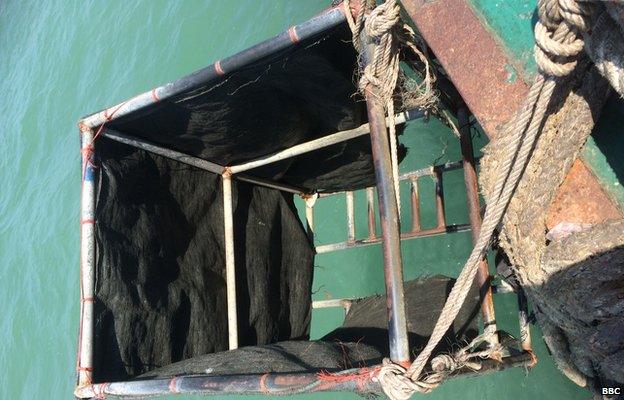
The migrants had built a makeshift toilet over the water with black plastic sheets
Onshore in Aceh, the migrants were taken to temporary shelters at Julok village.
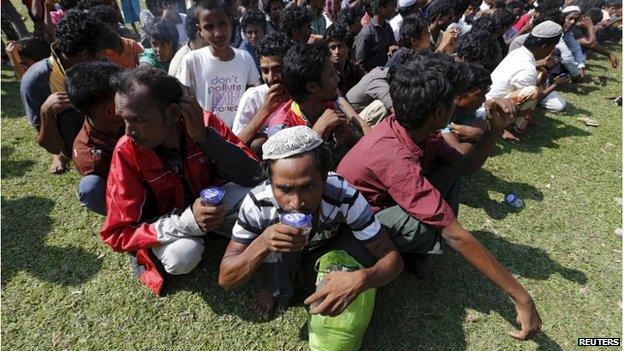
They were given fresh water
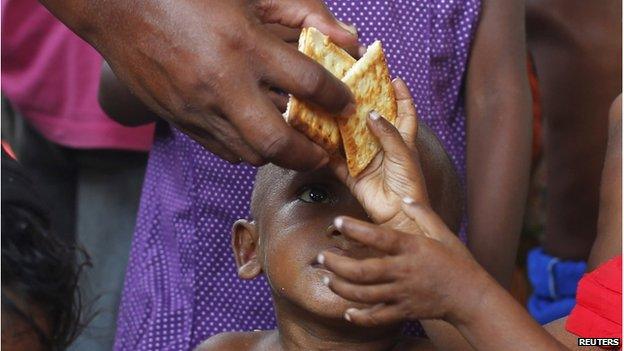
Volunteers also passed out packets of biscuits
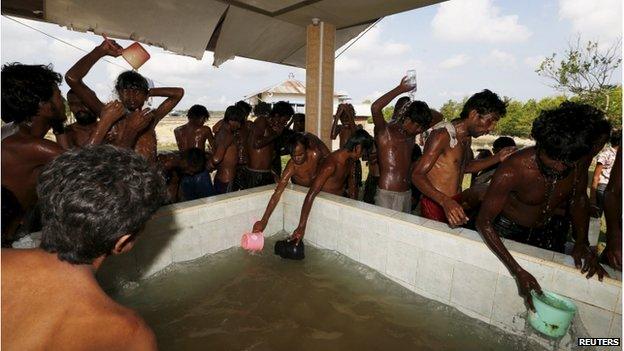
Many rushed to take a bath at a village well
The migrants were put on buses and taken to the nearby town of Langsa for processing.
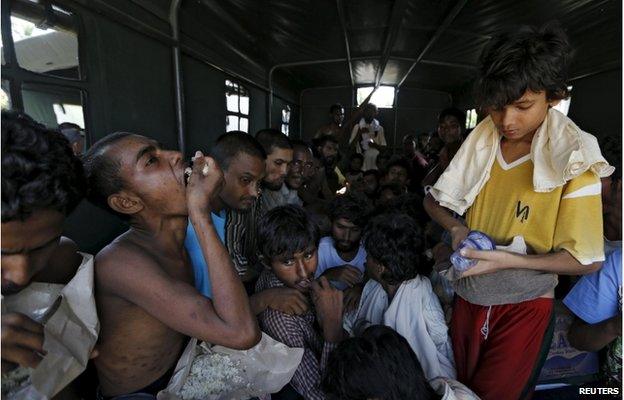
The migrants were put on trucks and taken to the nearest immigration office
Their arrival coincided with an announcement by Malaysia and Indonesia that they would not turn away migrant vessels and stop towing away boats.
Both countries said they would offer temporary shelter provided the migrants' resettlement is completed in one year.
The announcement is a glimmer of hope for these migrants who survived a perilous voyage at sea.